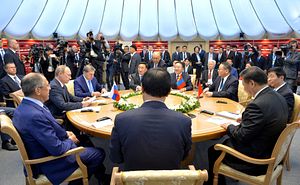As Diplomat authors have reported, trilateralism is all the rage these days. Ministerial-level dialogues sprinkle the sidelines of multilateral gatherings, and often set the tone for the more comprehensive leaders’ summits. For the past two weeks all eyes focused on the highly anticipated China-Japan-South Korea leaders’ summit, which concluded this past weekend. But here’s another big trilateral that you probably haven’t heard much about: China-Mongolia-Russia.
As Russian President Vladimir Putin has remarked himself, cooperation between the three countries only makes sense given their geographic proximity. After their first trilateral summit in September 2014, the three leaders met once more in July 2015. The three countries’ three foreign ministers have met twice in the same time frame.
Last week during the first-ever China-Mongolia Expo, the three countries signed a total of ten cross-border tourism cooperation agreements, which were framed as part of ongoing efforts to create an economic corridor linking the three countries. The agreements, worth approximately $220 million, included projects in tourism personnel training, development of tourist routes, and hotel and resort construction.
The economic corridor, meant to boost infrastructural and trade integration overall, is in line with individual policies in all three countries: China’s “One Belt, One Road” (OBOR), Russia’s Trans-Eurasian Belt Development (TEPR), and Mongolia’s Prairie Road program. Earlier this year, Chinese state broadcaster CCTV dubbed the trilateral corridor the “lifeline of the [OBOR] aorta.”
Naturally, the significance of the trilateral goes much deeper than a marriage of economic convenience. Perhaps the main reason that this trilateral makes sense — beyond simple geography — is that the three countries feel solidarity in having all transformed from socialist planned economies, and need each other to advance the developing nations’ voice in a world where they are increasingly told to take on heavier global responsibilities.
For Mongolia, establishing a regular formal dialogue with its two much more powerful neighbors increases its visibility in Asian diplomacy and fits perfectly with President Tsakhiagiin Elbegdorj’s ambitious international aspirations. Moreover, increasing engagement with Russia and China in a so-called ‘rebalance’ is a prudent tactical move to solidify its overall “third neighbor” strategy. Having gone through a significant economic downturn in recent years, Mongolia needs a strong economic base to reinvigorate its flexibility in foreign policy maneuvers with other nations. For instance, as Ulaanbaatar-based Central Asia specialist Gungaa Bazarvaani explains, Mongolia must foster stronger relations with China if it wants to improve access to Chinese ports, and thus open new markets for Mongolian exports.
China and Russia are more than happy to oblige. Russia is increasingly looking at its southern partners to build diplomatic alliances in light of recent alienation from the West. China’s enthusiasm for engagement is no doubt partly attributed to wanting to balance U.S. interests in the region by developing its own geopolitical sphere of influence. One fact that concerns some Chinese policymakers is that while China remains Mongolia’s largest trading partner, the U.S. has significant defense ties with the country.
There are also signs of possible trilateral cooperation beyond security and economics. In their first trilateral meeting, Chinese President Xi Jinping pushed for greater trilateral cooperation on think tanks, media, environmental protection and disaster prevention and relief in addition to the obvious economic mechanisms.
































